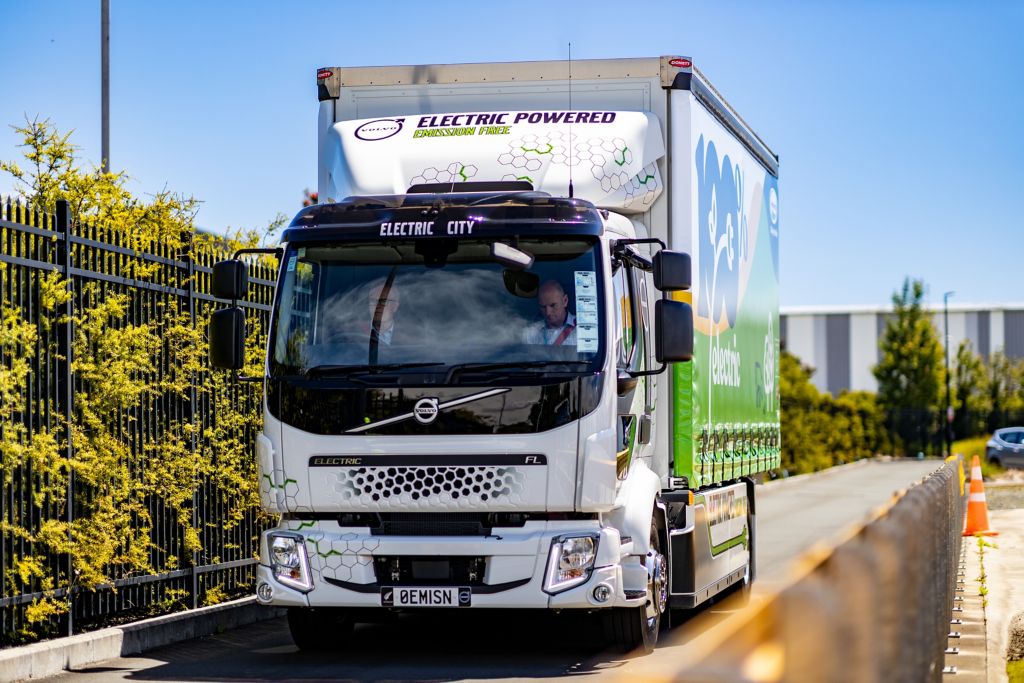Volvo electric trial leads to investment


In December 2022, Fonterra and Volvo Trucks New Zealand launched the first electric Volvo truck on New Zealand soil, followed by a trial to road test the unit in real world and real work conditions (New Zealand Trucking, February 2023).
Brent Fiecken, Fonterra GM logistics and distribution, had overall responsibility for the trial undertaken at Fonterra Brands NZ Distribution Centre in Mangere.
“Improving emissions across our entire supply chain is part of Fonterra’s overall commitment to sustainability and the electric truck is only one part of our overall decarbonisation strategy. We are looking to transition one third of our light vehicle fleet by the end of FY24, where fit for purpose electric solutions exist,” he explained.
Fiecken admits that he had a few questions around the electric truck’s range under load. “I was pretty confident that the driver experience would be good because a new Volvo truck is always a good experience. Going into the trial, the untested component was the impact on range under load.”
Over the course of the trial, the electric truck travelled 9000km, with loads maximised to deliver operational efficiencies, without any operational downtime.
The FLE routinely charged overnight before heading out for a day of metro runs. According to driver Raj Singh, the unit delivered a very different driving experience with a few surprises at the start. “Over the first 30 minutes driving, battery charge seemed to drop quite quickly before picking up again as it regenerated,” he said. The technology is designed to predict impact on battery use based on the previous day’s driving as well as variables like weather and air temperature. “I soon learned that this evens out. By the end of the day there was always more charge left than the 35% margin we maintained during the trial.
“Pick-up and speed are both great. Compared with conventional trucks, it’s more powerful, quiet and smooth, with no vibration. You don’t have to build in stops and wait time at gas stations or worry about overheating and running low on fuel in traffic. At full charge, the truck range was between 280km and 320km, but I could get up to 350km as the battery regenerated in stop-start metro driving.”
As confidence in battery performance and range grew, the Fonterra team started to test weight capacity. “We loaded the truck to the limits of its payload,” said Fonterra value chain transformation manager, Lamine Abderrahim. “There wasn’t much difference between performance under load, compared with a light load or a completely empty truck. Then we started to trial the truck at maximum tare weight on half a charge. It was a good proof of concept.”
Throughout the trial, manufacturer guidelines around drive speed and range were shown to be accurate.
“We used the Volvo range simulator a lot at the start to explore distances and impact on battery levels,” said Abderrahim.
With a successful trial in the bag, focus for the Fonterra and Volvo Trucks team shifted to what would come next. “There was a strong, established relationship between our tanker fleet and the Volvo team," said Fiecken. “But for us, this was a new relationship.
“The Volvo Trucks team has shown a high level of commitment and been responsive to our needs. We took our time discussing how to turn the trial experience into something operationally sustainable. The FLE wasn’t quite the right fit for us, so we started to look at a bigger truck with a refrigerated body.”
Delivery of the FE Electric is expected mid-2024. The unit will be fully operational across Auckland, clocking up 25,000km per year. It will have a capacity of 1000 crates and be part of a chilled unit fleet of 12 operating out of Takanini, delivering to supermarkets. It will drive a metro route to make the most of the potential for regeneration.
“This is part of Fonterra’s wider commitment to sustainability and we’re looking forward to having it on the road,” said Fiecken.
Article courtesy of NZ Truck & Driver, November 2023.